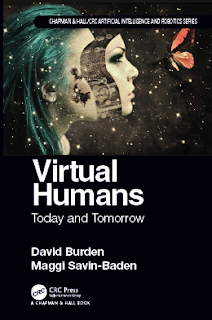Quite by chance this week I got reminded that I did a chapter for a book called The New Optimists back in 2009 on chatbots and virtual humans. The book showcased the views of scientists and engineers from around the Midlands on how they saw their own fields developing. Kate Cooper did an excellent job in pulling it all together and has continued to promote several of the themes developed in the book.
A few quotes from my own chapter - which at least show the persistency of my interests and thoughts!
Many, myself included, doubt whether the Turing Test is actually a good (or even sufficient) test of artificial intelligence
I for one am optimistic that we will see a Turing Test passed within the next few decades, maybe even within a single decade
In a virtual world we have a level playing field for any twenty-first century Turing Test.
The game has changed subtly, but significantly, from the bot having to prove it’s a human to just having not to give away the fact that it isn’t
The real opportunity of virtual worlds is that it gives the bot an environment in which to live and even grow in.






